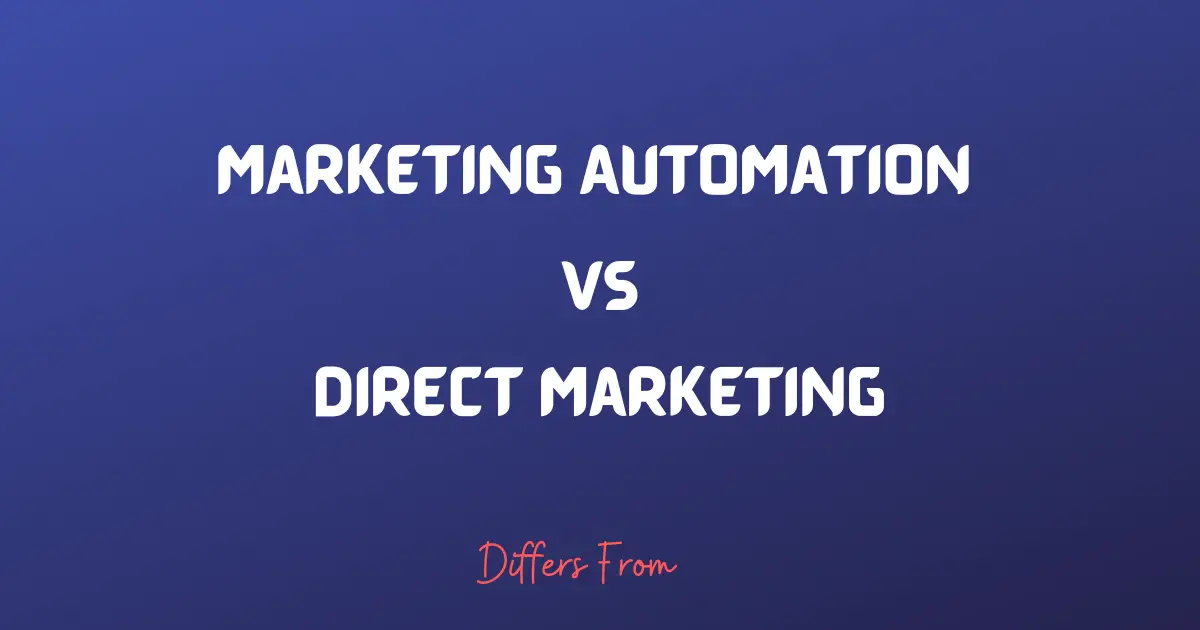Unlocking the realms of customer engagement, the dichotomy between Marketing Automation and Direct Marketing represents the crossroads where technology-driven precision meets the personalized touch of direct communication.
In the ever-evolving landscape of marketing strategies, understanding the nuances between these two approaches becomes paramount.
Join us as we delve into the intricacies of Marketing Automation and Direct Marketing, exploring how each methodology shapes the customer journey and influences brand success.
Let’s drive!
Difference between Marketing Automation and Direct Marketing
| Marketing Automation | Direct Marketing | |
| Nature of Interaction | Automated and systematic engagement through digital channels. | Personalized, direct communication with the target audience. |
| Channels Used | Relies on digital channels like email, social media, and websites. | Involves traditional channels such as mail, phone calls, and face-to-face interactions. |
| Automation Tools | Utilizes software and platforms for automated campaign execution. | Often involves manual processes and personal outreach. |
| Objective | Focuses on lead nurturing, relationship building, and long-term engagement. | Aims for immediate response and quick customer interactions. |
| Campaign Scope | Multi-channel campaigns with a broader reach. | Typically single-channel or limited-channel campaigns. |
| Measurement Metrics | Relies on analytics and data-driven insights for performance evaluation. | Success measured by direct response rates and customer feedback. |
| Campaign Examples | Automated email campaigns, drip campaigns, and social media scheduling. | Direct mail campaigns, telemarketing efforts, and in-person sales. |
| Resource Intensity | Emphasizes scalability and efficiency through automated processes. | Resource-intensive due to personalized, hands-on interactions. |
| Targeting Approach | Utilizes lead scoring and segmentation for targeted campaigns. | Relies on audience segmentation based on demographics and behavior. |
| Time Horizon | Focuses on longer-term engagement and customer lifecycle management. | Emphasizes immediate conversions and short-term results. |
What is marketing automation?
Marketing automation is the application of software to streamline and automate marketing efforts.
It involves utilizing technology to automate repetitive tasks, manage and nurture leads, track customer behavior, and deliver personalized content.
By leveraging automation, businesses can enhance efficiency, target specific segments, and optimize marketing campaigns. Ultimately, marketing automation aims to enhance customer engagement, drive conversions, and achieve marketing objectives more effectively.
What is direct marketing?
Direct marketing involves direct communication with individual customers or businesses to promote products or services. It can be executed through various channels like mail, email, phone calls, or text messages.
Direct marketing allows for personalized messaging, targeted audience segmentation, and measurable results. It is often used to generate leads, drive sales, and build customer relationships.
Comparison between marketing automation and direct marketing
Marketing automation and direct marketing are both strategies used by businesses to reach customers and promote their products or services.
While they share the goal of driving sales and building customer relationships, they differ in their approach and execution.
Marketing automation
Marketing automation refers to the use of software and technology to automate marketing tasks and processes.
- Workflow automation: It streamlines and automates repetitive marketing tasks such as email campaigns, lead nurturing, social media scheduling, and customer segmentation.
- Personalization: Marketing automation enables businesses to deliver personalized content and messages based on customer behavior, preferences, and demographics.
- Lead management: It helps manage leads throughout the sales funnel, from capturing and nurturing leads to converting them into customers.
- Scalability and efficiency: Automation allows businesses to handle larger volumes of leads and customers more efficiently, saving time and resources.
- Analytics and reporting: Marketing automation provides in-depth analytics and reporting on campaign performance, allowing businesses to measure and optimize their marketing efforts.
Direct marketing
Direct marketing involves directly communicating with individual customers or businesses to promote products or services.
- Channels: It can be executed through various channels such as mail, email, phone calls, text messages, and even face-to-face interactions.
- Personalized messaging: Direct marketing allows for highly personalized messaging, tailored to the specific needs and preferences of the target audience.
- Targeted audience segmentation: Businesses can segment their target audience based on demographics, purchase history, or other relevant criteria to deliver highly targeted messages.
- Immediate response: Direct marketing often elicits immediate responses from customers, facilitating instant feedback and engagement.
- Measurable results: Direct marketing campaigns can be easily tracked and measured, allowing businesses to assess the effectiveness of their marketing efforts and make data-driven decisions.
- Relationship building: Direct marketing provides opportunities for businesses to establish direct relationships with customers, fostering loyalty and long-term customer satisfaction.
Interesting facts about marketing automation
- Time-saving efficiency: Marketing automation can significantly save time for businesses by automating repetitive tasks such as email marketing, lead nurturing, and social media scheduling. This allows marketers to focus on more strategic activities, resulting in increased productivity and efficiency
- Personalization at scale: Marketing automation enables businesses to deliver personalized content and messages to a large audience. By leveraging customer data and behavior, businesses can create tailored experiences that resonate with individual customers, leading to higher engagement and conversion rates.
- Lead management and nurturing: Marketing automation platforms provide robust lead management capabilities. Businesses can track and nurture leads throughout the sales funnel, automate follow-ups, and deliver relevant content based on where customers are in their buying journey, improving the chances of converting leads into customers.
- Data-driven decision-making: Marketing automation generates valuable data and analytics on campaign performance, customer behavior, and conversion metrics. This data empowers businesses to make informed decisions, optimize marketing strategies, and allocate resources more effectively.
- Multichannel integration: Marketing automation allows businesses to execute campaigns across multiple channels, including email, social media, SMS, and more. This integration ensures consistent messaging and improves customer experience by reaching them through their preferred communication channels.
Interesting facts about direct marketing
- Targeted audience segmentation: Direct marketing allows businesses to segment their target audience based on specific criteria such as demographics, interests, or purchase history.
- Personalized messaging: Direct marketing offers the opportunity to create personalized messages that resonate with individual recipients.
- Immediate response and feedback: Direct marketing campaigns often elicit immediate responses from customers. Whether it’s a phone call, email, or direct mail, customers can provide feedback or make a purchase decision right away.
- Measurable results: Direct marketing provides measurable results that can be easily tracked and evaluated.
- Relationship building: Direct marketing allows businesses to establish direct and personal relationships with customers.
Conclusion
Marketing automation relies on technology to automate marketing tasks and personalize content at scale, while direct marketing involves direct communication channels and personalized interactions to build relationships with individual customers.

